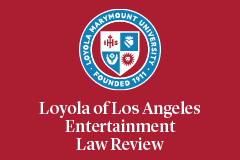Main ELR Website
LOYOLA
OF LOS ANGELES
ENTERTAINMENT LAW REVIEW
Volume Forty-Six |
2025-2026 |
NUMBER
1
|
| EDITORIAL BOARD | ||
| |
Ani Tarakchyan Editor-in-Chief |
|
| |
||
| Luis Cuevas Executive Editor |
Christopher Yalda Managing Editor |
Rachel Bastian Chief Technical Editor |
| Paul Simpson Chief Note & Comment Editor |
Sofia Tourgeman Chief Production Editor |
Ethan Mikhael Chief Research Editor |
| Dima Bazzi Chief Articles & Symposia Editor |
Chloe Rad Kaylyn Tran Chief News & Insights Editors |
Maya Domozetska Chief Alumni Relations & Symposia Editor |
| Samantha Zucker Senior Articles & Symposia Editor |
Vanessa Johnson Chief Diversity, Equity, & Inclusion Editor |
David Jin Senior Alumni Relations & Symposia Editor | Christina Baek Dylan Fischer Evan Greenwald Kerong Jin; Sophie Rahbar Amanda Skinner Gabriela Souferian Ifunanya Ugwumba Research Editors |
Rahul Arockiaraj Victoria De La Mora Senior Research Editors Lauren Ebrahimian Maria Martinez Rojas Senior Production Editors Colin Brumley Senior Note & Comment Editor |
Ashley Bowler Kim Hang Erik Harper Jaeyoung Jin Samantha Lopez Elita Minas Sarah Morris Jasleen Munsalud Cade Schobel Production Editors |
STAFF |
||
| Rahul Arockiaraj Andres Arciniega Michael Baldocchi Jennifer Benavides Becca Berkovits Caroleen Bitar Nicole Blizzard Aleksandros Blonk Athena Bongoyan Cameron Carey Joshua Michael Chan Ryan Cochran Michael Crumby Sophia Dwyer |
Evan Greenwald Jessica Gaisford Julian Gershon Aoife Gorshow Spencer Green Alexa Grines Jonathan Hay Beata Hitterer Natalie Khachikian Artin Khadourian Cynthia Le Jacqueline Moran Jessica Park |
Chloe Rad Zachery Poltor Oscar Prado Marianne Siapno Phoenix Silkensen Yasmin Sobhanian Tiffany Strachan Cinthia Tejeda Andrew Vecellio Vlad Vutov Tahj Williamson Camilla Wolff Emily Yamada Kathryn Young |
| ADVISORS | ||
| Johanna Infanzon Financial Administrative Advisor |
Robert Brain Yaphett Powell Faculty Advisors |
Tjay Jones-Smith Law Review & Academic Coordinator |
| Suzie Shatarevyan Website Advisor |
||
Past Editorial Board |


